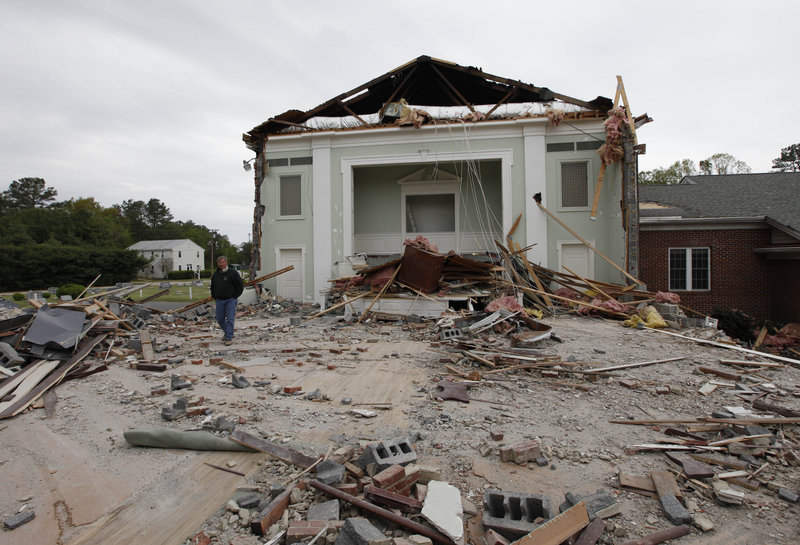DELTAVILLE, Va. – The huge holes in the walls of Zoar Baptist Church make it look like it was punched by a gigantic fist. The roof and steeple are gone, lost to one of the myriad tornadoes that wreaked deadly havoc from Oklahoma to Virginia.
The congregation will still celebrate Easter, of course, but not here.
As the initial shock wore off last week, a different feeling set in: gratitude. No one in the Deltaville congregation was killed by the storm system that left dozens of people dead in six states. As for having to rebuild, Zoar has been around since Thomas Jefferson was president, so it’s not the first time.
“I am enormously thankful and give praise to God because by the grace of God we were protected here,” said Carolyn Schmalenberger, who started going to the church as a baby more than 50 years ago. “For whatever reason — I don’t know, we will not know — what we will know is that we will rebuild here and we will be stronger for it.”
Death and rebirth form the theme of Christianity’s holiest day, and this year they strike to the core of congregations in Virginia, Oklahoma, Alabama, South Carolina and North Carolina whose churches were damaged or destroyed by the tornadoes.
Planned sunrise services are going forward, even in damaged buildings. But beyond that, pastors and worshippers say the storm has done more than give them a chance to persevere: It’s called them to re-examine the essentials of their faith.
“I wouldn’t wish this on anybody, but it’s good for us,” said the Rev. Doug Western, pastor of Kendale Acres Free Will Baptist Church in Sanford, N.C.
The church, in a quiet residential neighborhood, sustained some damage, including the loss of its steeple. But many of the homes surrounding it were so badly damaged as to make them uninhabitable. The church has become a de facto community center, stockpiling donated items and serving as a gathering point for volunteers distributing hot meals and cleaning up debris.
“We even asked ourselves, ‘Why is this church still standing, and everything is devastated around us?”‘ Western said. “But when we look at everyone in the fellowship hall, all the food and water and clothing that’s been distributed — that’s why. Something had to be here for people.”
Worshippers at Refuge Temple St. Stephen in St. Stephen, S.C., aren’t sure where they will worship on Easter Sunday, after the destruction of their 20-year-old sanctuary. But they know they will gather somewhere to offer praise and thanks.
“We’re together. Where there is unity there is strength,” said Terry Dingle, who has been a member of the congregation for 43 years. “There is nothing that happens that God doesn’t intend to happen. We’re doing good. We’re rooted in God’s word.”
Each day since the storm, women from the congregation gather under canopies in the church parking lot, cooking and providing cool drinks as the men work to clear away debris. Despite the damage, worshippers aren’t angry, Dingle said.
“That’s God’s work. And if we were to sit here and say we were angry after God has been so good to us? Oh no,” she said.
Religious communities are well prepared to withstand disasters, largely because they are well organized, said Nancy Ammerman, a professor at Boston University who studies American congregations.
Churches also are working across sectarian lines. The two churches in Askewville, N.C., a tiny town particularly hard hit by the storm, were polite but divergent on theology in good times, but have been united since the storm hit, throwing their doors open to each other and anyone else in need.
The Pentecostal members of the Askewville Assembly of God Church call the pastor at the Askewville Baptist Church “Brother David,” and he in turn describes the atmosphere in town as, despite everything, joyous.
Copy the Story Link
Send questions/comments to the editors.



Success. Please wait for the page to reload. If the page does not reload within 5 seconds, please refresh the page.
Enter your email and password to access comments.
Hi, to comment on stories you must . This profile is in addition to your subscription and website login.
Already have a commenting profile? .
Invalid username/password.
Please check your email to confirm and complete your registration.
Only subscribers are eligible to post comments. Please subscribe or login first for digital access. Here’s why.
Use the form below to reset your password. When you've submitted your account email, we will send an email with a reset code.